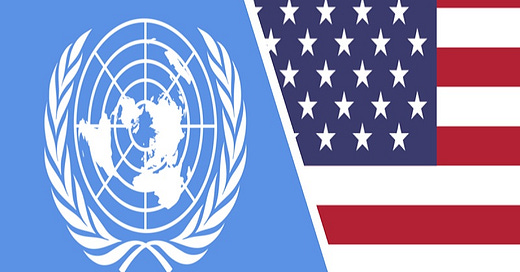Contrasting The US & UN Reactions To The Trumped-Up Terrorism Charges Against Imran Khan
The contrast between the US and UN stances is obviously attributable to the fact that the former has vested interests in upholding the post-modern coup regime whereas the second’s interests are connected to upholding the rules-based order as enshrined in that global body’s charter, which that aforesaid US-backed regime is violating with impunity since it’s confident in its patron’s support.
Pakistan’s post-modern coup regime is politically persecuting former Prime Minister Imran Khan by slapping him with trumped-up “terrorism” charges simply because he publicly announced that he’d be filing court cases against some of their representatives in response to their alleged abuse of his chief advisor Shahbaz Gill. State Department spokesman Ned Price reacted with indifference when asked about this during a press conference on Monday, casually replying that:
“We’re of course aware of the reports about the charges. This is a matter for the Pakistani legal and judicial system. It is not directly a matter for the United States, and that’s because we don’t have a position on one political candidate or party versus any other political candidate or party. We support the peaceful upholding of democratic, constitutional, and legal principles in Pakistan and around the world.”
Stéphane Dujarric, Spokesman for UN Secretary-General Antonio Guterres, was much more serious:
“What I can tell you is that the Secretary‑General is aware of the charges brought against the former Prime Minister Imran Khan, and he emphasises the need for a competent, independent and impartial legal process. The Secretary‑General urges calm, lowering of tensions and respect for the rule of law, human rights and fundamental freedoms.”
Quite clearly, these two representatives had opposite reactions, which will be analyzed in this piece.
Judging from the US’ response, it’s tacitly endorsing its proxies’ political persecution of its restored puppet state’s former premier despite the false national security pretext discrediting both of them. This very strongly implies that the post-modern coup regime probably received permission from Washington before making its move against him or might even have been ordered to do it at the US’ behest.
By contrast, the UN’s response acknowledges the severity of the situation and just how dangerous it is for this South Asian state’s stability. Dujarric also tacitly acknowledges concerns about the lack of judicial independence in Pakistan, hence his remarks about “the need for a competent, independent and impartial legal process.” Price, meanwhile, couldn’t be bothered to even superficially call for the same.
The impression that objective observers are left with is that Pakistan’s post-modern coup regime is emboldened by their American patron’s lack of interest in their political persecution of the most popular politician in the country. This in turn prompts worries that they might have received a blank check to deal with him however they’d like, which could lead to an ominous outcome in the worst-case scenario.
After all, his senior advisor has already allegedly been tortured, the accusations of which Amnesty International’s South Asian branch felt were credible enough to tweet their call for an “immediate, effective and impartial inquiry investigating these claims.” Once again, the US Government (USG) doesn’t care about what’s been said about their proxies, which reinforces the optics of tacit support.
The contrast between the US and UN stances is obviously attributable to the fact that the former has vested interests in upholding the post-modern coup regime whereas the second’s interests are connected to upholding the rules-based order as enshrined in that global body’s charter, which that aforesaid US-backed regime is violating with impunity since it’s confident in its patron’s support.




